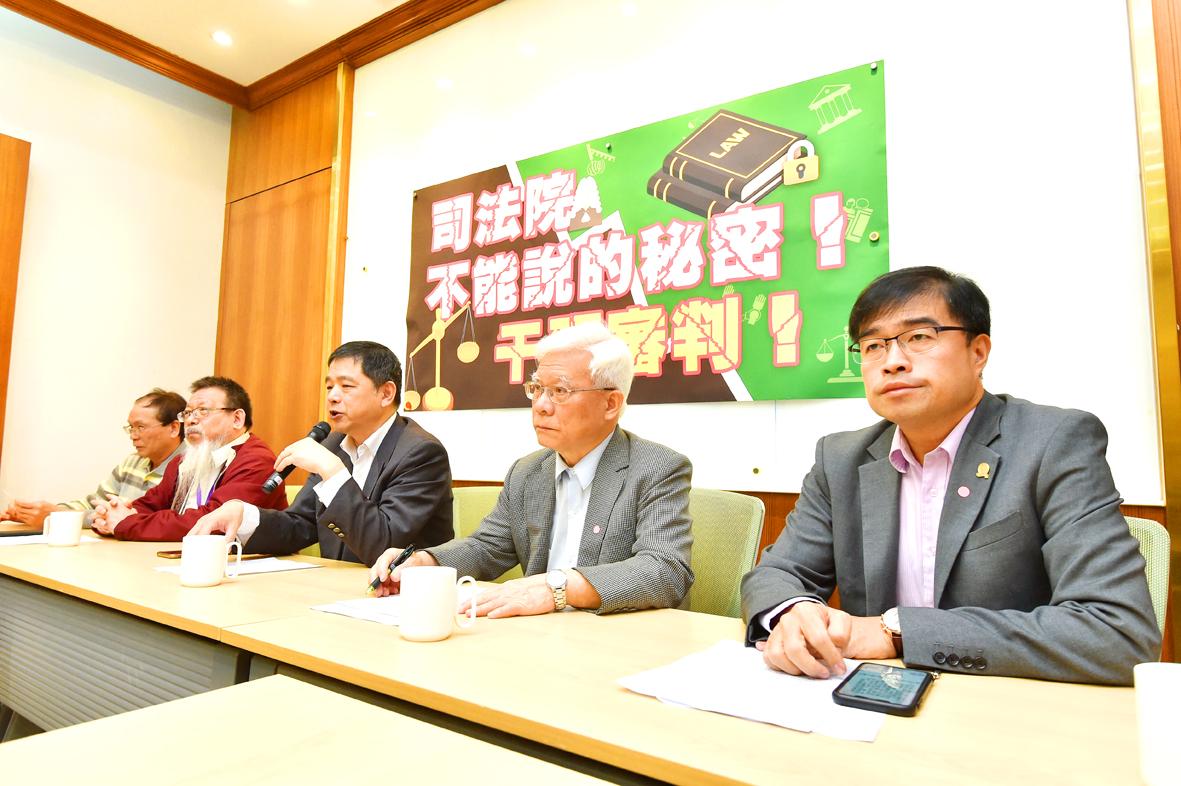The Taiwan Jury Association and other legal experts yesterday accused Judicial Yuan President Hsu Tzong-li (許宗力) of promoting “fake judicial reforms” by pushing a “lay judge system” instead of adopting a jury system.
Poll after poll has shown that Taiwanese have little trust in the nation’s justice system, “because most of them do not believe decisions made by judges are fair and impartial,” said attorney Jerry Cheng (鄭文龍), founder of the association.
They do not trust judges because they believe their judgements are influenced by politics and money — “two major problems that have long plagued Taiwan’s justice system,” Cheng told a news conference in Taipei.

Photo: Tu Chien-jung, Taipei Times
Cheng and other legal experts blasted Hsu’s presentation on Monday of a half-year progress report on the outcome of a national conference on judicial reform.
They questioned Hsu’s “positive” talk about judicial reforms, which he said have achieved a lot, with public trust in the justice system increasing.
“More than 80 percent of respondents in a poll want to participate in ruling on cases, and 95 percent of those who had taken part in simulated court sessions support adoption of a lay judge system,” Hsu said.
Association deputy chairman Chang Ching (張靜), a former prosecutor and judge, said that Hsu “misleads with fake news about the high support for [civilians] participating in rulings, because most respondents did not know if the Judicial Yuan was going for a lay judge system or a jury system. Hsu is deceiving everyone by blocking a jury system, which is what the public wants.”
“From our public polls over the past few years, which were conducted by universities, more than 80 percent of people support a jury system as a way of reforming Taiwan’s justice system,” Chang added.
Cheng said that in a lay judge system, the main decisionmaking power is still in the hands of a court judge, who can control the lay judge serving on the bench, “thereby opening up [the system] to political intervention and graft to influence judgements.”
Cheng cited as an example 2011, when the High Court caught four judges and one prosecutor for corruption.
Moreover, “while talking to my friends recently, I heard some of them discussing ways to offer bribes to judges. This shows that the problem of corrupt judges remains,” he said.
He added that “political intervention was very prevalent during the Chinese Nationalist Party (KMT) authoritarian regime, which meddled in the justice system,” he said.
“Former KMT leader and president Chiang Kai-shek (蔣介石) personally intervened in about 3,000 rulings, according to findings by the Transitional Justice Commission,” he said.
Among the files and documents uncovered by the commission were handwritten messages by Chiang in 876 cases, in which he changed the rulings for dissidents and political prisoners from imprisonment to orders to “put them to death,” “execution by firing squad,” or to be “handed capital punishment.”

US President Donald Trump said "it’s up to" Chinese President Xi Jinping (習近平) what China does on Taiwan, but that he would be "very unhappy" with a change in the "status quo," the New York Times said in an interview published yesterday. Xi "considers it to be a part of China, and that’s up to him what he’s going to be doing," Trump told the newspaper on Wednesday. "But I’ve expressed to him that I would be very unhappy if he did that, and I don’t think he’ll do that," he added. "I hope he doesn’t do that." Trump made the comments in

NOT AN OPENING: Trump’s violation of international law does not affect China’s consideration in attacking Taiwan; Beijing lacks capability, not precedent, an official said Taiwanese officials see the US’ capture of the president of Venezuela as a powerful deterrent to Beijing’s aggression and a timely reminder of the US’ ability to defeat militaries equipped with Chinese-made weapons. The strikes that toppled Venezuelan President Nicolas Maduro signaled to authoritarian leaders, including Chinese President Xi Jinping (習近平), US President Donald Trump’s willingness to use military might for international affairs core to US interests, one senior official in Taipei’s security circle said. That reassured Taiwan, the person said. Taipei has also dismissed the idea that Trump’s apparent violation of international law could embolden Beijing, said the official, who was not

A cold surge advisory was today issued for 18 cities and counties across Taiwan, with temperatures of below 10°C forecast during the day and into tonight, the Central Weather Administration (CWA) said. New Taipei City, Taipei, Taoyuan and Hsinchu, Miaoli and Yilan counties are expected to experience sustained temperatures of 10°C or lower, the CWA said. Temperatures are likely to temporarily drop below 10°C in most other areas, except Taitung, Pingtung, Penghu and Lienchiang (Matsu) counties, CWA data showed. The cold weather is being caused by a strong continental cold air mass, combined with radiative cooling, a process in which heat escapes from

Snow this morning fell on Alishan for the first time in seven years, as a strong continental cold air mass sent temperatures plunging across Taiwan, the Central Weather Administration (CWA) said. The Alishan weather station, located at an elevation of about 2,200m in central Taiwan, recorded snowfall from 8:55am to 9:15am, when the temperature dropped to about 1°C, the CWA said. With increased moisture and low temperatures in the high-altitude Alishan area, the conditions were favorable for snow, CWA forecaster Tsai Yi-chi (蔡伊其) said. The last time snow fell at the Alishan weather station was on Jan. 10, 2018, while graupel fell there